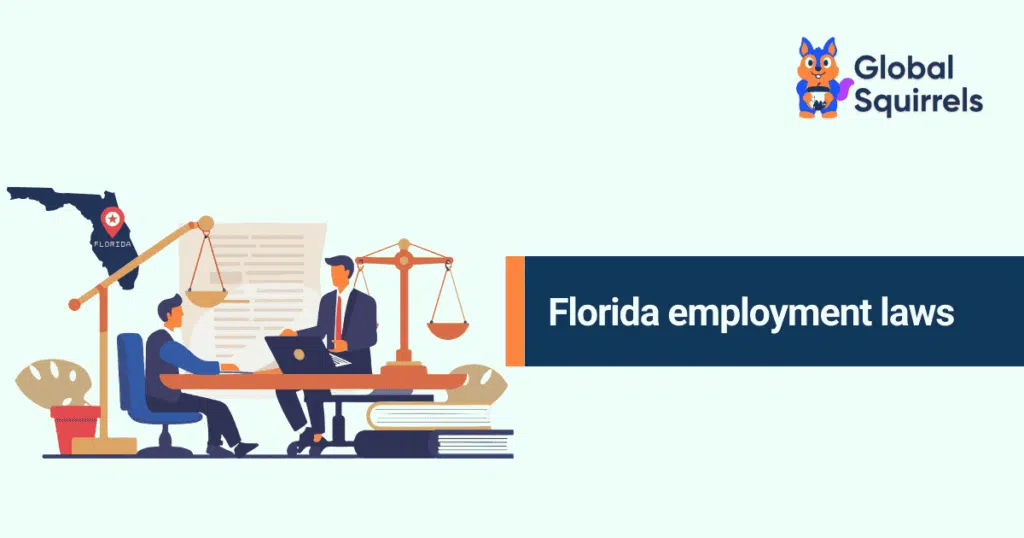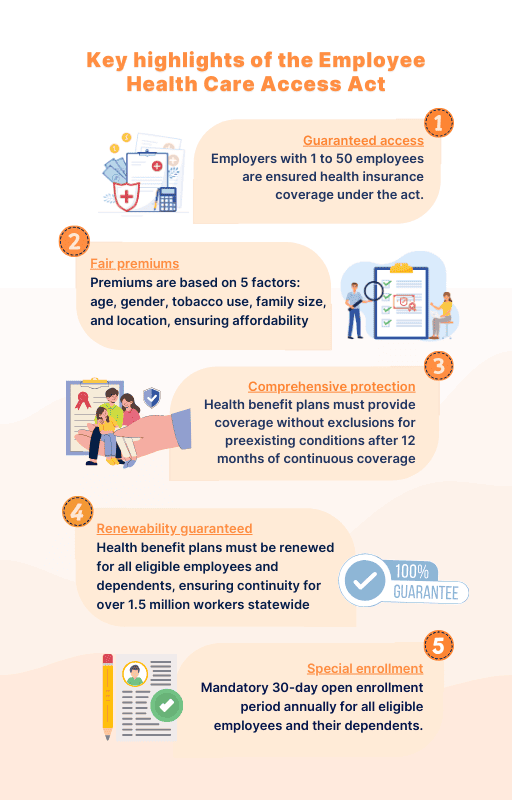Understanding Florida employment laws

Florida employers must navigate a unique framework of regulations known as Florida employment laws that shape the employee-employer relationship. These include Florida workplace laws on minimum wage, overtime, discrimination, and leave policies, as well as specific provisions protecting Florida employee rights. Adhering to these Florida labor laws is essential for businesses to operate both legally and ethically while fostering a positive work environment.
In this blog, we will look at some of the most important regulations, describe the potential risks of failing to comply, and demonstrate how Global Squirrels can assist businesses in navigating the complexities of these challenges without any gaps with support and compliance solutions.
What are some key Florida labor laws?
Minimum wages & overtime pay
The minimum wage in Florida, governed by Florida employment laws, increased to $13.00 per hour on September 30, 2024. These adjustments are part of Florida labor laws under Amendment 2, which was approved by voters to gradually raise the state’s minimum wage to $15.00 per hour by 2026.
Employers are required by Florida workplace laws to display the current minimum wage in a visible location for employees. Adhering to these regulations is essential to protect Florida employee rights and maintain compliance. For businesses, that means planning ahead to make sure their payment practices play along with these updates.
Overtime pay in Florida is governed by federal regulations under the Fair Labor Standards Act (FLSA), which apply alongside Florida employment laws. Under these provisions, nonexempt employees must be paid one and one-half times their regular hourly rate for hours worked in excess of 40 in a workweek.
While Florida workplace laws do not set separate state-specific overtime rules, employers in Florida must comply with federal standards to ensure they uphold Florida labor laws and protect Florida employee rights. Under the FLSA, a workweek is a fixed and recurring period of 168 hours (seven 24-hour consecutive days), and overtime pay must be computed on a workweek basis. Employers must pay employees for overtime hours on the regular payday for the pay period in which such wages were earned.
Work hours
Work hours in Florida are primarily governed by federal regulations under the Fair Labor Standards Act (FLSA) and provisions of Florida employment laws. As per Florida workplace laws, employees are typically expected to work up to 40 hours per week under normal conditions, excluding overtime.
The weekly hours of any employee who is covered under an approved short-time compensation plan can be reduced by up to 40%, and the employee can share remaining work hours in proportion to the reduction in hours while proportionate compensation is paid. This arrangement protects Florida employee rights by helping businesses avoid layoffs while ensuring employees receive part of their wages and benefits during reduced work periods. Employers must ensure their work-hour policies comply with federal and Florida workplace laws to maintain legal and ethical operations.
Leaves
Florida’s leave laws are based on both federal requirements and Florida-specific provisions to protect an employee’s rights. Florida does not have its own comprehensive family and medical leave law, but employers in Florida do have to follow federal laws such as the Family Medical Leave Act (FMLA) that allows eligible employees to take up to 12 weeks of unpaid, job-protected leave during a 12 month period for qualifying reasons. Reasons for such leave are because you have had a child, adopted a child, or you have to care for a family member with a serious medical condition, or you have a personal medical issue so that you can not work. Employees also have grievances under the FMLA for health benefits throughout the leave and for reinstatement to pre- or equivalent jobs upon return.
Florida’s employment laws provide leave protections for specific situations, such as military family leaves for ‘qualifying exigencies’ or up to 26 weeks to care for a covered service member with a serious injury or illness. These provisions align with Florida labor laws to support employees facing personal or family health challenges.
In addition, Florida has other leave provisions, such as jury duty leave, domestic violence leave, and voting leave, which are designed to uphold Florida employee rights and ensure fair treatment in the workplace. Employers in Florida must remain compliant with both federal and Florida workplace laws to foster a supportive work environment and avoid legal repercussions.
Benefits
Florida benefit laws guarantee employees get fair access to health care and other essential benefits provided as a result of state and federal regulations. The Florida Employee Health Care Access Act is a cornerstone of Florida employment laws, designed to promote the availability of health insurance coverage for small employers and their employees. This law guarantees that small businesses can sell guaranteed-issue health benefit plans, regardless of claims history or the health status of employees, and protects them with things like limits on preexisting condition exclusions.
Employers must also comply with Florida workplace laws governing eligibility for benefits like health insurance. For example, employees working at least 25 hours per week are generally considered eligible for health benefits under Florida labor laws, provided they meet the waiting period and other requirements. In addition, they were required to maintain uniform premium rate-setting practices and maintain fairness in the health benefit plan offerings.
Additionally, Florida employee rights include protections for dependents, guaranteed renewability of health plans, and access to annual open enrollment periods. Specific coverage standards must be met by health plans, and employees or dependents may not be excluded from coverage because of health status or claims history. If you are a small business, the state will give you mechanisms to access affordable healthcare options, like the Florida Small Employer Health Reinsurance Program for small businesses.
Employers must remain compliant with Florida labor laws to uphold Florida employee rights and create equitable workplaces where all eligible employees can access the benefits they deserve. Failure to adhere to these benefit laws can lead to penalties for both employers and employees.
Source link: https://www.flsenate.gov/laws/statutes/2023/627.6699
Discrimination and harassment laws
Florida’s employment laws, workplace laws, and labor laws protect employees against discrimination and harassment. The Florida Civil Rights Act of 1992 (FCRA) prohibits discrimination in the workplace on the basis of race, color, religion, sex, pregnancy, national origin, age, disability, or marital status. Employers with 15 or more employees must follow these laws in how they treat employees when hiring, promoting, compensating, and in all other workplace practices.
Harassment, including sexual harassment and behavior that creates a hostile work environment, is explicitly prohibited under Florida workplace laws. Employers are required to pursue anti-harassment efforts on their own. If a complaint is filed with the Florida Commission on Human Relations (FCHR) within 365 days of the conclusion of the discriminatory treatment, employees can seek back pay, compensatory damages, and punitive damages not to exceed $100,000.
In addition to the FCRA, Florida labor laws protect employees from retaliation for whistleblowing or reporting workplace violations. Protections extend to employees facing discrimination due to genetic information or HIV/AIDS status, reinforcing the principles of Florida employee rights.
Without them, these are just words on a piece of paper, these laws are the lifeblood of a fair and equitable workplace, providing employees with legal channels to resolve grievances, and doing so in an environment of respect and accountability.
Related Read: Understanding Arkansas employment laws and Colorado labor laws
What are the challenges of not complying with Florida laws?
Failure to comply with Florida workplace and labor laws can result in significant penalties for employers, ranging from financial fines to legal actions. Non-compliance with wage and hour laws, for example, failing to meet the state’s minimum wage or overtime requirements, can result in lawsuits in which employers may be forced to pay the employer the amount of unpaid wages and damages equal to unpaid wages, plus attorney fees. The Florida Minimum Wage Act mandates penalties of $1,000 per violation for intentional wage violations, ensuring Florida employee rights are protected.
Under the Florida Civil Rights Act, there are legal claims for violation of anti-discrimination laws, and employees can become entitled to compensatory damages, including emotional distress and punitive damages. In addition, workplace safety regulation breaches could draw fines of up to $14,000 per breach from the Occupational Safety and Health Administration (OSHA). Failing to comply with hiring laws like E-Verify is a serious offense that can result in fines of $1,000 a day and suspension or revocation of your business license, depending on how bad the infraction is. These penalties underscore the need for employers to abide by Florida’s labor laws in order to avoid unfair treatment and workplace non-compliance.
How does Global Squirrels help eliminate all the challenges?
Global Squirrels provides advanced staffing and payrolling solutions, allowing you to easily hire and manage your workforce. Our platform offers an online platform for key HR functions, including payroll processing, benefits management, task and timesheet tracking, compliance with Florida employment laws, and performance management. Unlike most staffing agencies, which inflate their costs by 50%, Global Squirrels saves you 20% on recruitment costs.
When you partner with Global Squirrels, you reduce the risk of non-compliance with Florida labor laws. This is because our platform ensures that you stay compliant with all of these regulations so you do not face any legal complications. Our platform also ensures that you access regulatory frameworks, helps with employee classification challenges, and keeps you up to date with changes in employment laws using compliance analytics and expert support.
Global Squirrels ensures you meet all your business needs efficiently by offering the Purple and Orange plans
Orange plan
The Orange plan is designed to help you recruit the best talent for your business in the easiest way possible. Once you sign up, you will fill out a form that details the requirements of your job, including title, description, budget, start date, educational background, skills, and preferred hiring locations. You will receive a curated list of candidate profiles within 2 to 5 business days. After you choose your candidate, our platform handles all HR functions, including payroll management, benefits administration, performance management, compliance with Florida labor laws, task & timesheet management, and customized offer letters.
Purple plan
If you want to convert freelancers into full-time employees or hire already-sourced candidates, the Purple plan is for you. The plan helps you manage all your employees’ HR functions, such as generating offer letters with employment clauses to bind and secure exclusive commitments and specify notice periods. Once onboarding begins, our platform kicks off the necessary HR functions such as payroll management, benefits setup, task & timesheet management, performance management, and compliance with all Florida labor laws.
Optimize your HR and staffing needs by requesting a demo today!

